外研版(2019)高中英语选择性必修第四册 Unit1 Looking forwards Understanding ideas 公开课课件(共56张PPT)
文档属性
| 名称 | 外研版(2019)高中英语选择性必修第四册 Unit1 Looking forwards Understanding ideas 公开课课件(共56张PPT) | 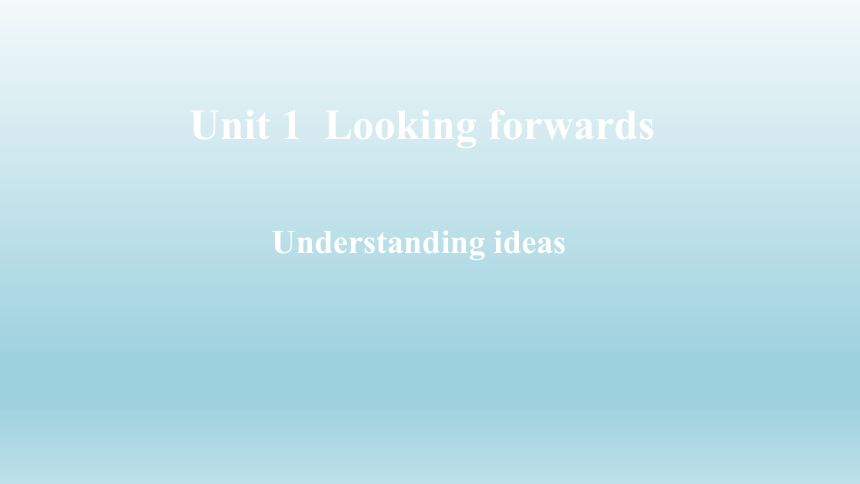 | |
| 格式 | pptx | ||
| 文件大小 | 1.2MB | ||
| 资源类型 | 教案 | ||
| 版本资源 | 外研版(2019) | ||
| 科目 | 英语 | ||
| 更新时间 | 2023-03-06 21:59:54 | ||
图片预览

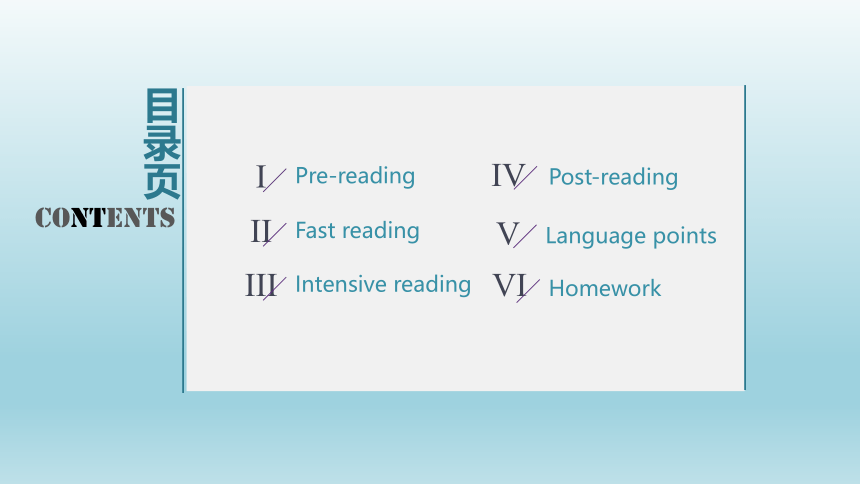
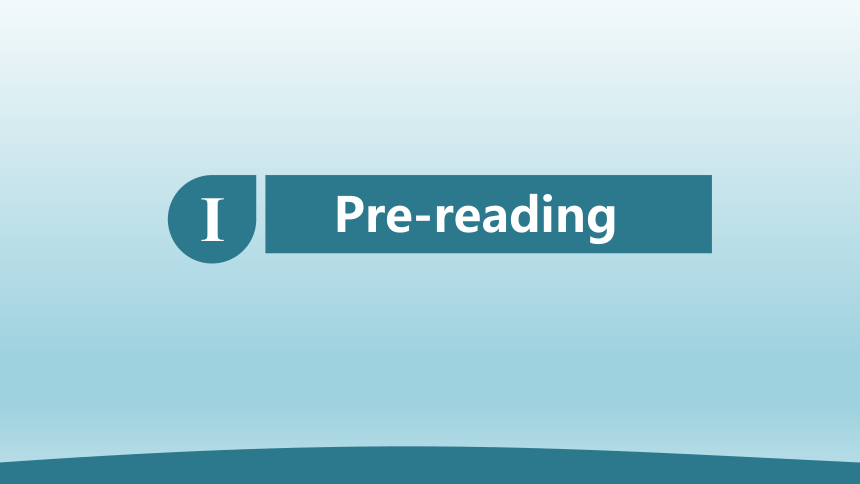
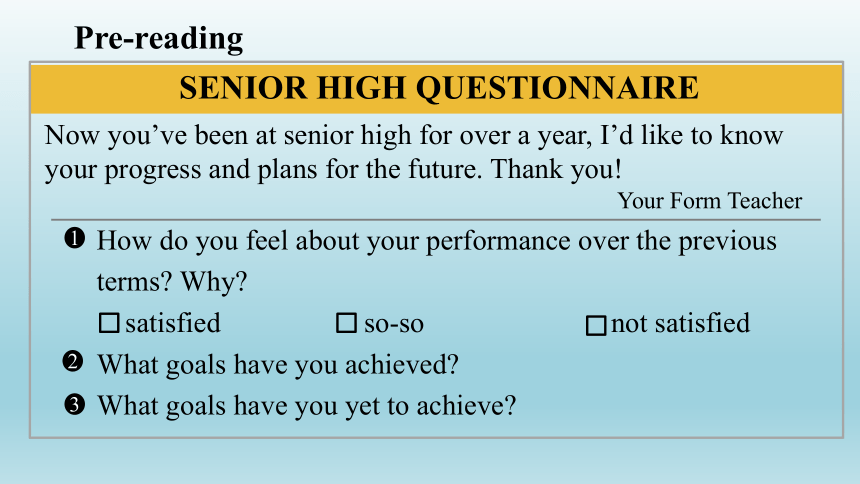

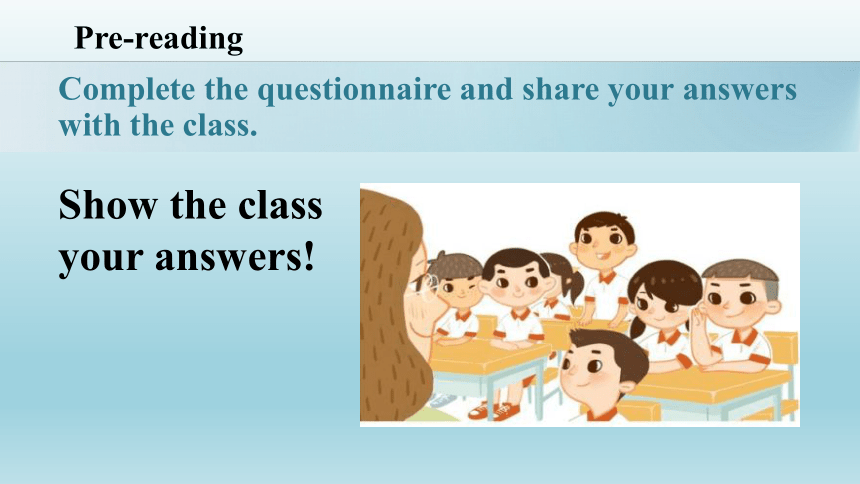
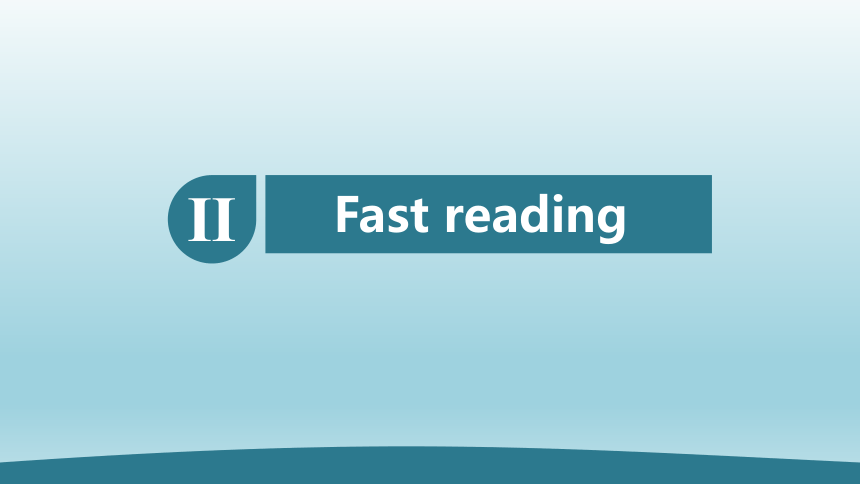

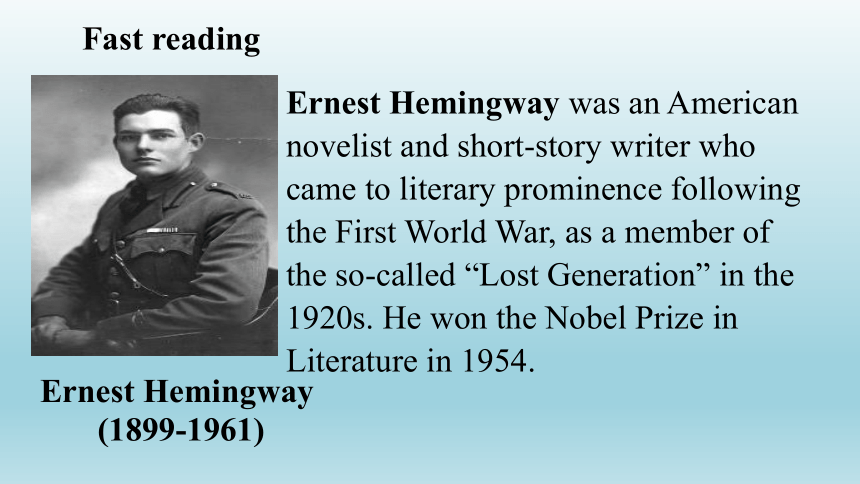

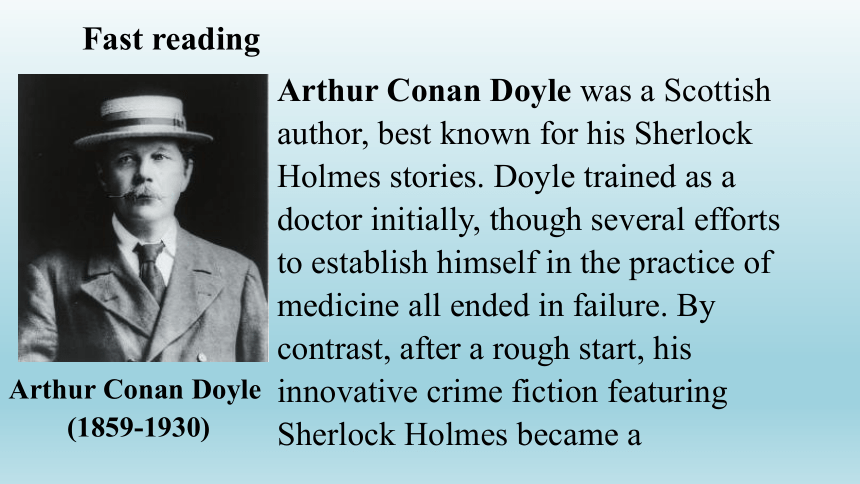
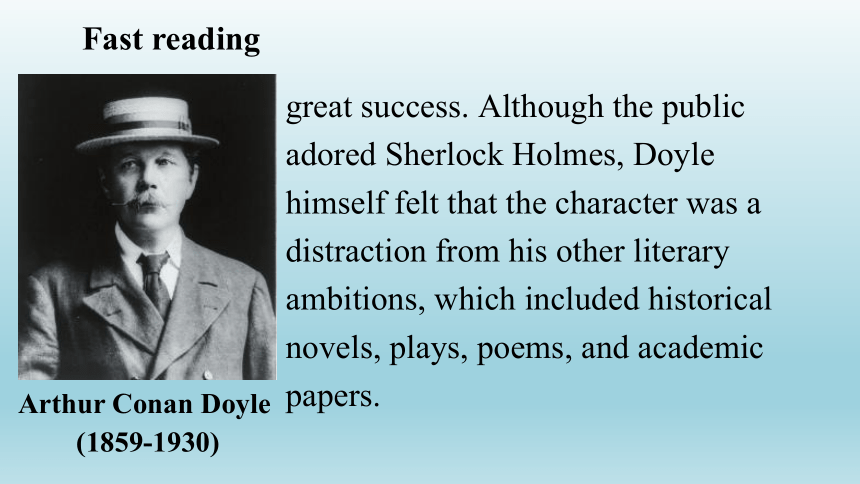
文档简介
(共56张PPT)
Understanding ideas
Unit 1 Looking forwards
目录页
contents
Pre-reading
I
Language points
Ⅳ
Fast reading
II
Homework
Ⅴ
Intensive reading
III
VI
Post-reading
Ⅰ
Pre-reading
Pre-reading
SENIOR HIGH QUESTIONNAIRE
Now you’ve been at senior high for over a year, I’d like to know your progress and plans for the future. Thank you!
Your Form Teacher
How do you feel about your performance over the previous terms Why
satisfied so-so not satisfied
What goals have you achieved
What goals have you yet to achieve
3
2
1
Pre-reading
SENIOR HIGH QUESTIONNAIRE
Now you’ve been at senior high for over a year, I’d like to know your progress and plans for the future. Thank you!
Your Form Teacher
What will you do about the goals you want to achieve
How do you plan to achieve these goals
5
4
Pre-reading
Show the class your answers!
Complete the questionnaire and share your answers with the class.
Ⅱ
Fast reading
Fast reading
Look at the title and predict what the passage is about.
Different jobs people might do in the future.
Stories about different people’s future.
Various possibilities for future development.
Fixed future for everyone.
Now read the passage and check your prediction.
Fast reading
Ernest Hemingway was an American novelist and short-story writer who
came to literary prominence following the First World War, as a member of the so-called “Lost Generation” in the 1920s. He won the Nobel Prize in Literature in 1954.
Ernest Hemingway
(1899-1961)
He had an understated prose style and a restrained method of exposition, which he termed the “iceberg theory” (because he believed that a great deal could be understood in a narration even if it was deliberately unmentioned). His most famous novels include The Sun Also Rises, A Farewell to Arms and The Old Man and the Sea.
Ernest Hemingway
(1899-1961)
Fast reading
Arthur Conan Doyle was a Scottish author, best known for his Sherlock Holmes stories. Doyle trained as a doctor initially, though several efforts to establish himself in the practice of medicine all ended in failure. By contrast, after a rough start, his innovative crime fiction featuring Sherlock Holmes became a
Arthur Conan Doyle
(1859-1930)
Fast reading
great success. Although the public adored Sherlock Holmes, Doyle himself felt that the character was a distraction from his other literary ambitions, which included historical novels, plays, poems, and academic papers.
Arthur Conan Doyle
(1859-1930)
Fast reading
None of Doyle’s other writing ever achieved close to the success of the Holmes material, however. Holmes and his assistant, Dr Watson, remain popular characters across the world today.
Arthur Conan Doyle
(1859-1930)
Fast reading
III
Intensive reading
Intensive reading
Match the questions to the paragraphs and find out the answers.
a. What is possibly the most important concern in life
b. What was Doyle’s main writing ambition
c. What can you do when faced with uncertainty about the future
d. What is the relationship between one’s plans and the
1
4
6
2
Intensive reading
Match the questions to the paragraphs and find out the answers.
future
e. Why was Doyle disappointed with the success of his Holmes stories
f. What did Hemingway do to achieve his ambition to become a writer
5
3
Answer the questions.
1. What is possibly the most important concern in life
The most important concern in life is possibly the future.
2. What is the relationship between one’s plans and the future
Sometimes one’s plans may have a great influence on the future, but having plans in place for the future is no guarantee that they will become reality.
Intensive reading
Answer the questions.
3. What did Hemingway do to achieve his ambition to become a writer
On leaving high school, Ernest Hemingway joined a local Kansas newspaper as a trainee reporter. He went on to become foreign correspondent for the Toronto Star and used his extraordinary experiences in Europe and later Cuba to inform his writing.
Intensive reading
Answer the questions.
4. What was Doyle’s main writing ambition
Doyle’s main ambition was to become a writer of historical novels.
5. Why was Doyle disappointed with the success of his Holmes stories
He was disappointed because he still longed to become known for his historical novels amongst other academic works but the readers loved his Holmes stories better.
Intensive reading
Answer the questions.
6. What can you do when faced with uncertainty about the future
Be prepared for the unexpected and trust that what you are doing now will somehow connect in your future.
Intensive reading
Organise information from the passage and complete the chart.
Ernest Hemingway
Arthur Conan Doyle
Similarities
He was born in the US in 1899.
He ___________since boyhood.
He wrote __________.
He won ___________.
They both
_________.
They shared _________.
He was born in Scotland in 1859.
He first worked as ________, but ___________.
He created ______, Sherlock Holmes.
He had wanted to be remembered for ______, but ________.
Intensive reading
Ernest
Hemingway
He was born in the US in 1899.
He __________________________________ since boyhood.
He wrote _____________________________
__________________________________________________________________________
_____________________________________.
He won ______________________________
_____________________________________.
was single-minded in his ambition to write
novels and short stories based on his personal experiences of the First World War, the Spanish Civil War, bullfighting and deep-sea fishing, amongst others
the Pulitzer Prize for Fiction in 1953 and won the Nobel Prize in Literature later
Intensive reading
Arthur Conan Doyle
He was born in Scotland in 1859.
He first worked as ________, but ________
___________________________________
___________________________________.
He created __________________________, Sherlock Holmes.
He had wanted to be remembered for ___________________________________________, but ________________________________________.
a doctor
Doyle’s main ambition was to become a writer of historical novels
the fictional detective
his historical novels amongst other academic works
the public couldn’t get enough of Sherlock Holmes
Intensive reading
Ernest Hemingway
Arthur
Conan Doyle
Similarities
They both ______________________.
They shared _____________________
_______________________________.
were ultimately successful
the same ambitious and energetic approach to life
Intensive reading
Now read the sentence from the passage and answer the questions.
So, whatever twists and turns you might encounter, take a leaf out of the books of these two authors and be prepared for the unexpected.
1. What is your understanding of “take a leaf out of the books”
2. What effect is the author aiming to achieve by using it
3. What other expressions do you know that share the same meaning
Intensive reading
1. What is your understanding of “take a leaf out of the books”
One possible answer:
In my opinion, it means that you can copy the way someone else behaves because you want to be like them or be as successful as they are.
Intensive reading
Now read the sentence from the passage and answer the questions.
Now read the sentence from the passage and answer the questions.
2. What effect is the author aiming to achieve by using it
The author aims to maintain the reader’s interest by using this figure of speech, and perhaps to end with a lighter note by using a pun.
Intensive reading
3. What other expressions do you know that share the same meaning
Students’ own answers.
Intensive reading
Now read the sentence from the passage and answer the questions.
Ⅳ
Post-reading
We have learned the stories about Ernest Hemingway and Arthur Conan Doyle from the above parts. Now discuss with your partners to dig up more information.
Post-reading
1. What is your understanding of Steve Jobs’s words at the end of the passage
2. What can you learn about facing the future from the two authors
3. What will you do to prepare yourself for the future
4. Do you know any stories about Chinese writers and their plans for the future What lessons can you learn
from their experiences Share your opinions with the class.
Post-reading
1. What is your understanding of Steve Jobs’s words at the end of the passage
You cannot make sense of your life by looking forward, because the future has not happened yet, and the meaning of future events is therefore uncertain. However, once future events have occurred, you may be able to see how they fit into the pattern of your life. Things which you did not expect to be important may turn out to be very important. You must face the future by believing that everything will work out in the end, and that your life will make sense and have meaning.
Post-reading
2. What can you learn about facing the future from the two authors
One possible answer:
What the future will be like is uncertain. We should work hard on the goal we’ve set but at the same time be prepared for the unexpected.
Post-reading
3. What will you do to prepare yourself for the future
One possible answer:
Set a clear goal and make the most of the time and chances to work hard on it.
Meanwhile, prepare myself for the unexpected in the future.
Post-reading
4. Do you know any stories about Chinese writers and their plans for the future What lessons can you learn from their experiences
One possible answer:
The Chinese writer Mo Yan, who has won the Nobel Prize for literature, used to be a naughty boy. When he was in Grade Three, he read some novels and these novels aroused his passion for literature. Then he gradually went further on the road to create literature works.
Post-reading
Language points
Ⅴ
He didn’t approach the front door at once.
他没有马上走向前门。
approach v.
① 靠近;接近;走近
Language points
② 临近;来临
As autumn approached, the plants and colours in the garden
changed. 秋天临近,花园中的草木和颜色也发生了变化。
Language points
③ 探讨;处理;对待
The Bank has approached the issue in a practical way.
银行已经实际解决了这个问题。
① 路径;途径;道路
The path serves as an approach to the boat house.
这条小路通往船屋。
approach n.
② 方法;态度;手段
We will be exploring different approaches to gathering
information. 我们将探索收集信息的不同方法。
approach 作名词用,常和介词 to 连用。
Language points
① 遇到,遭遇(问题、困难)
Every day of our lives we encounter stresses of one
kind or another. 在每天的生活中我们会遇到这样或
那样的压力。
2. encounter v.
② 偶遇;邂逅
Did you encounter anyone in the building
你在大楼里遇到谁了么?
Language points
The author tells of a remarkable encounter with a group of South Vietnamese soldiers. 作者讲述了和一群南越士兵的奇遇。
encounter n. 偶遇;邂逅;(重要的)相逢
Language points
1. worry about __________________
2. take action to do sth __________________
3. come one’s way __________________
4. on doing sth __________________
5. by contrast __________________
担心;担忧
发生在某人身上
采取行动做某事
一……就……
相比之下;与……相反
Language points
6. be known for ___________________
7. devote oneself to doing sth ___________________
8. long to do sth ___________________
9. turn out ___________________
10. be prepared for ___________________
专注于做某事
渴望做某事
证明是;结果是;原来是
因……而著名
为……做好准备
Language points
1. Will we get into the school of our choice
Paraphrase: Will we be admitted to the school that we choose for ourselves
of one’s choice 是介词短语在句中作后置定语,起着定语从句的作用。
Language points
在本篇文章中,用介词短语代替从句(状语从句),或代替分词短语的句子还有:
In the face of such questions, how should we approach the future
介词短语 in the face of 相当于 when 或 if 引导的状语从句:When / If we face such questions, how should we approach the future
或相当于分词 faced with 或 facing引导的句子:Faced with / Facing such questions, how should we approach the future
Language points
在本篇文章中,用介词短语代替从句(状语从句),或代替分词短语的句子还有:
In the face of such questions, how should we approach the future
介词短语 in the face of 相当于 when 或 if 引导的状语从句:When / If we face such questions, how should we approach the future
Language points
2. In this respect, some people are more fortunate than others, as can be illustrated by comparing the lives of two famous authors, born 40 years apart.
Paraphrase: Considering this, some people are luckier than others. This can be shown by comparing the lives of two famous authors who were born 40 years apart.
句中短语 in this respect 表示“在这方面”。
Language points
例如:
Let me give another example to illustrate this point.
让我举另一个例子来阐明这一点。
illustrate 是动词,意为“阐明” 。
illustrate 是动词,它的名词形式为 illustration。
Language points
3. Although they shared the same ambitious and energetic approach to life, their careers unfolded in contrasting ways.
Paraphrase: They were both ambitious and energetic people, but their careers turned out to be very different.
本句中的 share 意为 to have the same opinion, experience, feeling etc as someone else。
Language points
I share your concern about this.
我和你一样为此担心。
We both share an interest: playing chess after work.
我们有个共同的兴趣爱好:下班后下棋。
Robert is the only person who shares my opinion.
Robert是唯一和我意见相同的人。
share 还可用于:share sth with sb 和某人分享某物
Language points
本句中的 unfolded in contrasting ways 意为 developed in quite different ways。
例如:
Facing the future academic planning, they unfolded in contrasting ways.
面对未来的学术规划,它们以截然不同的方式发展。
Language points
4. The American author, Ernest Hemingway, born in 1899, was from early boyhood single-minded in his ambition to write.
Paraphrase: Ernest Hemingway, an American author who was born in 1899, had only one ambition in his life since childhood: to write.
本句中的短语 born in 1899 相当于一个非限制性定语从句,可以用 who 引导的定语从句 who was born in 1899 替换。
Language points
本句中的 single-minded 意为 very determined to achieve something。
例如:
Her single-minded commitment to the job meant that she had little time left for her family. 她对工作一心一意的奉献意味着她很少有时间留给自己的家庭。
single-minded 是一种常见的合成词构词现象,由“adj. + n. + -ed”构成一个合成形容词。
Language points
类似的还有 absent-minded, warm-hearted, cold-blooded, bad-tempered, short-sighted, iron-willed, bare-handed, long-legged, short-armed 等。
在合成词的构词中,adj. 还可以用 num. 替换,构成合成形容词,如:one-eyed, four-legged, five-fingered, three-toed 等。
Language points
VI
Homework
Homework
1. Summarize what you’ve learnt today;
2. Search the Internet to know more about the two authors and some famous Chinese writers.
Understanding ideas
Unit 1 Looking forwards
目录页
contents
Pre-reading
I
Language points
Ⅳ
Fast reading
II
Homework
Ⅴ
Intensive reading
III
VI
Post-reading
Ⅰ
Pre-reading
Pre-reading
SENIOR HIGH QUESTIONNAIRE
Now you’ve been at senior high for over a year, I’d like to know your progress and plans for the future. Thank you!
Your Form Teacher
How do you feel about your performance over the previous terms Why
satisfied so-so not satisfied
What goals have you achieved
What goals have you yet to achieve
3
2
1
Pre-reading
SENIOR HIGH QUESTIONNAIRE
Now you’ve been at senior high for over a year, I’d like to know your progress and plans for the future. Thank you!
Your Form Teacher
What will you do about the goals you want to achieve
How do you plan to achieve these goals
5
4
Pre-reading
Show the class your answers!
Complete the questionnaire and share your answers with the class.
Ⅱ
Fast reading
Fast reading
Look at the title and predict what the passage is about.
Different jobs people might do in the future.
Stories about different people’s future.
Various possibilities for future development.
Fixed future for everyone.
Now read the passage and check your prediction.
Fast reading
Ernest Hemingway was an American novelist and short-story writer who
came to literary prominence following the First World War, as a member of the so-called “Lost Generation” in the 1920s. He won the Nobel Prize in Literature in 1954.
Ernest Hemingway
(1899-1961)
He had an understated prose style and a restrained method of exposition, which he termed the “iceberg theory” (because he believed that a great deal could be understood in a narration even if it was deliberately unmentioned). His most famous novels include The Sun Also Rises, A Farewell to Arms and The Old Man and the Sea.
Ernest Hemingway
(1899-1961)
Fast reading
Arthur Conan Doyle was a Scottish author, best known for his Sherlock Holmes stories. Doyle trained as a doctor initially, though several efforts to establish himself in the practice of medicine all ended in failure. By contrast, after a rough start, his innovative crime fiction featuring Sherlock Holmes became a
Arthur Conan Doyle
(1859-1930)
Fast reading
great success. Although the public adored Sherlock Holmes, Doyle himself felt that the character was a distraction from his other literary ambitions, which included historical novels, plays, poems, and academic papers.
Arthur Conan Doyle
(1859-1930)
Fast reading
None of Doyle’s other writing ever achieved close to the success of the Holmes material, however. Holmes and his assistant, Dr Watson, remain popular characters across the world today.
Arthur Conan Doyle
(1859-1930)
Fast reading
III
Intensive reading
Intensive reading
Match the questions to the paragraphs and find out the answers.
a. What is possibly the most important concern in life
b. What was Doyle’s main writing ambition
c. What can you do when faced with uncertainty about the future
d. What is the relationship between one’s plans and the
1
4
6
2
Intensive reading
Match the questions to the paragraphs and find out the answers.
future
e. Why was Doyle disappointed with the success of his Holmes stories
f. What did Hemingway do to achieve his ambition to become a writer
5
3
Answer the questions.
1. What is possibly the most important concern in life
The most important concern in life is possibly the future.
2. What is the relationship between one’s plans and the future
Sometimes one’s plans may have a great influence on the future, but having plans in place for the future is no guarantee that they will become reality.
Intensive reading
Answer the questions.
3. What did Hemingway do to achieve his ambition to become a writer
On leaving high school, Ernest Hemingway joined a local Kansas newspaper as a trainee reporter. He went on to become foreign correspondent for the Toronto Star and used his extraordinary experiences in Europe and later Cuba to inform his writing.
Intensive reading
Answer the questions.
4. What was Doyle’s main writing ambition
Doyle’s main ambition was to become a writer of historical novels.
5. Why was Doyle disappointed with the success of his Holmes stories
He was disappointed because he still longed to become known for his historical novels amongst other academic works but the readers loved his Holmes stories better.
Intensive reading
Answer the questions.
6. What can you do when faced with uncertainty about the future
Be prepared for the unexpected and trust that what you are doing now will somehow connect in your future.
Intensive reading
Organise information from the passage and complete the chart.
Ernest Hemingway
Arthur Conan Doyle
Similarities
He was born in the US in 1899.
He ___________since boyhood.
He wrote __________.
He won ___________.
They both
_________.
They shared _________.
He was born in Scotland in 1859.
He first worked as ________, but ___________.
He created ______, Sherlock Holmes.
He had wanted to be remembered for ______, but ________.
Intensive reading
Ernest
Hemingway
He was born in the US in 1899.
He __________________________________ since boyhood.
He wrote _____________________________
__________________________________________________________________________
_____________________________________.
He won ______________________________
_____________________________________.
was single-minded in his ambition to write
novels and short stories based on his personal experiences of the First World War, the Spanish Civil War, bullfighting and deep-sea fishing, amongst others
the Pulitzer Prize for Fiction in 1953 and won the Nobel Prize in Literature later
Intensive reading
Arthur Conan Doyle
He was born in Scotland in 1859.
He first worked as ________, but ________
___________________________________
___________________________________.
He created __________________________, Sherlock Holmes.
He had wanted to be remembered for ___________________________________________, but ________________________________________.
a doctor
Doyle’s main ambition was to become a writer of historical novels
the fictional detective
his historical novels amongst other academic works
the public couldn’t get enough of Sherlock Holmes
Intensive reading
Ernest Hemingway
Arthur
Conan Doyle
Similarities
They both ______________________.
They shared _____________________
_______________________________.
were ultimately successful
the same ambitious and energetic approach to life
Intensive reading
Now read the sentence from the passage and answer the questions.
So, whatever twists and turns you might encounter, take a leaf out of the books of these two authors and be prepared for the unexpected.
1. What is your understanding of “take a leaf out of the books”
2. What effect is the author aiming to achieve by using it
3. What other expressions do you know that share the same meaning
Intensive reading
1. What is your understanding of “take a leaf out of the books”
One possible answer:
In my opinion, it means that you can copy the way someone else behaves because you want to be like them or be as successful as they are.
Intensive reading
Now read the sentence from the passage and answer the questions.
Now read the sentence from the passage and answer the questions.
2. What effect is the author aiming to achieve by using it
The author aims to maintain the reader’s interest by using this figure of speech, and perhaps to end with a lighter note by using a pun.
Intensive reading
3. What other expressions do you know that share the same meaning
Students’ own answers.
Intensive reading
Now read the sentence from the passage and answer the questions.
Ⅳ
Post-reading
We have learned the stories about Ernest Hemingway and Arthur Conan Doyle from the above parts. Now discuss with your partners to dig up more information.
Post-reading
1. What is your understanding of Steve Jobs’s words at the end of the passage
2. What can you learn about facing the future from the two authors
3. What will you do to prepare yourself for the future
4. Do you know any stories about Chinese writers and their plans for the future What lessons can you learn
from their experiences Share your opinions with the class.
Post-reading
1. What is your understanding of Steve Jobs’s words at the end of the passage
You cannot make sense of your life by looking forward, because the future has not happened yet, and the meaning of future events is therefore uncertain. However, once future events have occurred, you may be able to see how they fit into the pattern of your life. Things which you did not expect to be important may turn out to be very important. You must face the future by believing that everything will work out in the end, and that your life will make sense and have meaning.
Post-reading
2. What can you learn about facing the future from the two authors
One possible answer:
What the future will be like is uncertain. We should work hard on the goal we’ve set but at the same time be prepared for the unexpected.
Post-reading
3. What will you do to prepare yourself for the future
One possible answer:
Set a clear goal and make the most of the time and chances to work hard on it.
Meanwhile, prepare myself for the unexpected in the future.
Post-reading
4. Do you know any stories about Chinese writers and their plans for the future What lessons can you learn from their experiences
One possible answer:
The Chinese writer Mo Yan, who has won the Nobel Prize for literature, used to be a naughty boy. When he was in Grade Three, he read some novels and these novels aroused his passion for literature. Then he gradually went further on the road to create literature works.
Post-reading
Language points
Ⅴ
He didn’t approach the front door at once.
他没有马上走向前门。
approach v.
① 靠近;接近;走近
Language points
② 临近;来临
As autumn approached, the plants and colours in the garden
changed. 秋天临近,花园中的草木和颜色也发生了变化。
Language points
③ 探讨;处理;对待
The Bank has approached the issue in a practical way.
银行已经实际解决了这个问题。
① 路径;途径;道路
The path serves as an approach to the boat house.
这条小路通往船屋。
approach n.
② 方法;态度;手段
We will be exploring different approaches to gathering
information. 我们将探索收集信息的不同方法。
approach 作名词用,常和介词 to 连用。
Language points
① 遇到,遭遇(问题、困难)
Every day of our lives we encounter stresses of one
kind or another. 在每天的生活中我们会遇到这样或
那样的压力。
2. encounter v.
② 偶遇;邂逅
Did you encounter anyone in the building
你在大楼里遇到谁了么?
Language points
The author tells of a remarkable encounter with a group of South Vietnamese soldiers. 作者讲述了和一群南越士兵的奇遇。
encounter n. 偶遇;邂逅;(重要的)相逢
Language points
1. worry about __________________
2. take action to do sth __________________
3. come one’s way __________________
4. on doing sth __________________
5. by contrast __________________
担心;担忧
发生在某人身上
采取行动做某事
一……就……
相比之下;与……相反
Language points
6. be known for ___________________
7. devote oneself to doing sth ___________________
8. long to do sth ___________________
9. turn out ___________________
10. be prepared for ___________________
专注于做某事
渴望做某事
证明是;结果是;原来是
因……而著名
为……做好准备
Language points
1. Will we get into the school of our choice
Paraphrase: Will we be admitted to the school that we choose for ourselves
of one’s choice 是介词短语在句中作后置定语,起着定语从句的作用。
Language points
在本篇文章中,用介词短语代替从句(状语从句),或代替分词短语的句子还有:
In the face of such questions, how should we approach the future
介词短语 in the face of 相当于 when 或 if 引导的状语从句:When / If we face such questions, how should we approach the future
或相当于分词 faced with 或 facing引导的句子:Faced with / Facing such questions, how should we approach the future
Language points
在本篇文章中,用介词短语代替从句(状语从句),或代替分词短语的句子还有:
In the face of such questions, how should we approach the future
介词短语 in the face of 相当于 when 或 if 引导的状语从句:When / If we face such questions, how should we approach the future
Language points
2. In this respect, some people are more fortunate than others, as can be illustrated by comparing the lives of two famous authors, born 40 years apart.
Paraphrase: Considering this, some people are luckier than others. This can be shown by comparing the lives of two famous authors who were born 40 years apart.
句中短语 in this respect 表示“在这方面”。
Language points
例如:
Let me give another example to illustrate this point.
让我举另一个例子来阐明这一点。
illustrate 是动词,意为“阐明” 。
illustrate 是动词,它的名词形式为 illustration。
Language points
3. Although they shared the same ambitious and energetic approach to life, their careers unfolded in contrasting ways.
Paraphrase: They were both ambitious and energetic people, but their careers turned out to be very different.
本句中的 share 意为 to have the same opinion, experience, feeling etc as someone else。
Language points
I share your concern about this.
我和你一样为此担心。
We both share an interest: playing chess after work.
我们有个共同的兴趣爱好:下班后下棋。
Robert is the only person who shares my opinion.
Robert是唯一和我意见相同的人。
share 还可用于:share sth with sb 和某人分享某物
Language points
本句中的 unfolded in contrasting ways 意为 developed in quite different ways。
例如:
Facing the future academic planning, they unfolded in contrasting ways.
面对未来的学术规划,它们以截然不同的方式发展。
Language points
4. The American author, Ernest Hemingway, born in 1899, was from early boyhood single-minded in his ambition to write.
Paraphrase: Ernest Hemingway, an American author who was born in 1899, had only one ambition in his life since childhood: to write.
本句中的短语 born in 1899 相当于一个非限制性定语从句,可以用 who 引导的定语从句 who was born in 1899 替换。
Language points
本句中的 single-minded 意为 very determined to achieve something。
例如:
Her single-minded commitment to the job meant that she had little time left for her family. 她对工作一心一意的奉献意味着她很少有时间留给自己的家庭。
single-minded 是一种常见的合成词构词现象,由“adj. + n. + -ed”构成一个合成形容词。
Language points
类似的还有 absent-minded, warm-hearted, cold-blooded, bad-tempered, short-sighted, iron-willed, bare-handed, long-legged, short-armed 等。
在合成词的构词中,adj. 还可以用 num. 替换,构成合成形容词,如:one-eyed, four-legged, five-fingered, three-toed 等。
Language points
VI
Homework
Homework
1. Summarize what you’ve learnt today;
2. Search the Internet to know more about the two authors and some famous Chinese writers.
